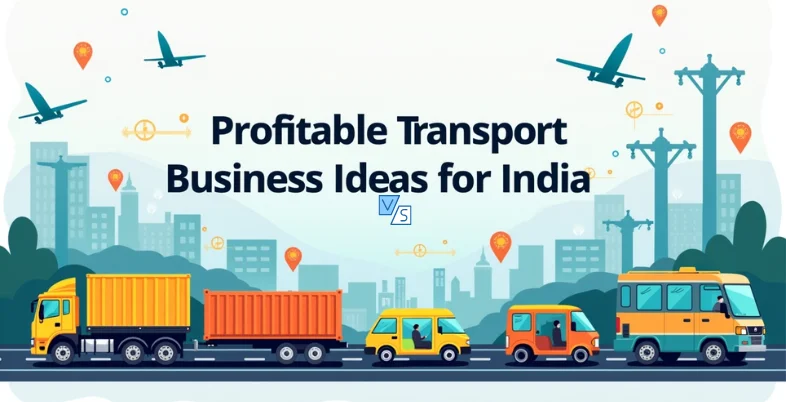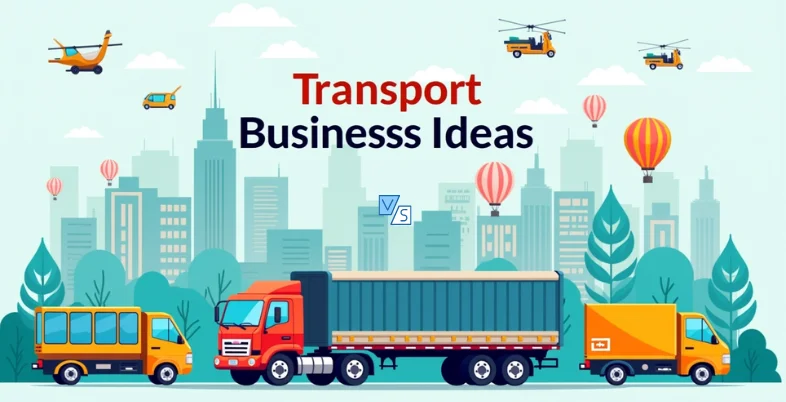12 Profitable Transport Business Ideas for India

India’s transportation system is expanding at a rapid pace because of increased urbanization, the rise of technology and the world’s highest number of young people. Considering logistics will be a $380 billion market by 2025 and e-commerce is expected to increase by 25% every year, the transport industry offers major opportunities for entrepreneurs at all investment levels.
What makes the Indian transport system special are its different geography, various infrastructure conditions and local preferences. In cities where quick delivery is needed and in rural areas where agriculture supplies must move, both areas offer individual business opportunities. Greater progress in the sector is being achieved due to government programs such as Digital India, Make in India and new projects in the National Infrastructure Pipeline.
Anyone starting a business with hardly any money and also those already established in business can find flexible transportation opportunities that deliver good returns quickly. Transport Business Ideas for India become even more promising when companies understand local demand, use new technology, and plan business strategies that tackle real transportation needs.
Why Transport Business is Booming in India
Several unique factors are combined to push India’s transport revolution forward. Over 750 million people in the country now use the internet and having smartphones in many rural areas is helping to increase demand for digital transport.
In cities, people are adjusting to fast-changing habits and many are ready to spend extra for the ease that convenience offers. Because there are more nuclear families, women working outside the home and double-income households, there is more demand for organized transportation today. At the same time, traditional businesses are updating their supply chains and working to find trustworthy logistics partners to remain competitive.
Thanks to government policy, GST has formalized the logistics sector and the Startup India project offers new transport firms advantages in the regulatory area. Transport businesses are seeing their costs drop and their markets widen due to investments in highways, ports and digital infrastructure.
Market Opportunities and Trends
There are many unmet needs in the Indian transport space and these unmet needs combined with new trends give great opportunities for enterprising individuals. Tier-2 and tier-3 cities show the most potential for new growth because their infrastructure improves but there are limited organized transport options available. They grant early adopters lower competition and less expense to run their businesses.
Using technology is now bringing about improved customer needs, where things such as quick track updates, cashless transactions and immediate services are expected. Yet, many train, bus and taxi operators are not taking part in these new developments, allowing tech-driven entrepreneurs to compete by focusing on better customer experience.
As sustainability grows, the number of companies and customers who choose environmentally friendly transport is increasing. More smart companies and electric vehicle firms in transport are choosing electric vehicles, shared mobility options, and better route planning to both protect the environment and cut long-term costs.
List of 12 Profitable Transport Business Ideas

1. E-commerce Last-Mile Delivery
India’s e-commerce industry is set to become a $350 billion sector by the year 2030, so there are widespread chances in last-mile delivery. In this business, packages are delivered to customers’ houses from nearby distribution centers. As more people shopped online after COVID, the need for goods became steady in cities of all sizes.
Investment Required: You will need ₹2-5 lakhs to begin which covers 2-3 delivery vehicles, two mobile phones, fuel expenses and the first stock needed for work.
Profit Margin: The company makes 15-25% per order and earnings of ₹15-40 per delivery. An urban area’s delivery executive often completes 30-60 deliveries each day.
Your chance of success will increase if you team up with Amazon, Flipkart, Myntra or nearby retailers. Using technology to improve route planning and track trucks in real time is very important for growing a fleet.
2. Hyperlocal Grocery Delivery
Ordering produce locally from your home is easier than ever, thanks to pioneers like Blinkit, Zepto and BigBasket Now. The business plan is to get groceries and everyday things to customers within 10–30 minutes from stores nearby — a model that also inspires several Transport Business Ideas for India focused on fast, efficient last-mile delivery.
Investment Required: The investment needed is from ₹3-8 lakhs covers the inventory, needed vehicles, creating a mobile app and getting connected to local shops.
Profit Margin: Profit is secured by delivery costs (₹15-30 per delivery) and getting a 5-15% cut from each partner store’s sales.
Effective food vending depends on connecting well with local vendors and having good inventory control. The key areas targeted are residential complexes, IT parks and crowded urban areas since demand dictates top prices.
3. Inter-City Parcel Transport Business
Inter-city parcel delivery helps smaller communities and towns that aren’t served by large courier companies. They exploit the fact that both important national services and common local options are unreliable for flights between medium and small-sized cities.
Investment Required: It is necessary to spend Rs.5-15 lakhs on vehicles (tempo/mini-truck), registering the business, getting insurance, setting up tracking and opening collection spots.
Profit Margin: You can expect a profit of 20-35% since each unit of delivery will cost a fee between ₹50 and ₹200 based on both the distance and its urgency.
Being successful means having agents in multiple cities, sticking to regular timetables and competitively positioning on price. Head toward business-to-business markets, supporting merchants of textiles, electronics, small manufacturers, and manufacturing firms who usually require dependable and economical drop-shipping services regularly.
4. School and Corporate Bus Transport Business
Because India’s cities are expanding, there is a constant demand for organized travel services for schools and companies. Every day, this business provides shuttles on standard routes, making sure students and employees get safe transport.
Investment Required: The total cost involved is estimated to be about ₹8-25 lakhs for each bus, covering the price of the bus, driver pay, fuel, insurance permissions and GPS equipment.
Profit Margin: Monthly contracts for passengers cost ₹1,500 to ₹4,000 and the profit margin for buses is about 25-40%.
With the business, companies get consistent payments that come in advance. The company succeeds by focusing on vehicle quality, being punctual adhering to safety standards and establishing ongoing contracts with schools and businesses. Its corridors and neighborhood roads provide the most lucrative business results for electric bikes.
Also Read: How to Start a School in India
5. Goods Transportation (Tempo/Truck Services)
The logistics needs of India are largely covered by small and medium transport of goods. Among the strategies in these Transport Business Ideas is using local shifting, wholesale market deliveries, and moving goods regionally with tempos, mini-trucks, or full-sized trucks.
Investment Required: Depending on the size of the vehicle, expected costs range from ₹3 lakhs (Ace) to ₹20 lakhs (medium trucks).
Profit Margin: You can expect profit margins of 20-30% daily, with each vehicle’s profits ranging between ₹1,500-8,000, based on its use.
Success is mostly dependent on making relationships with wholesalers, manufacturers and retailers. Dealing with companies on recurring deals for monthly shipments gives me a regular source of income. Areas that include wholesale markets, zones for industry and construction areas offer ongoing chances.
6. Cab/Taxi Transport Business
The logistics needs of India are largely covered by small and medium transport of goods. Among the strategies is using local shifting, wholesale market deliveries and moving goods regionally with tempos, mini-trucks or full-sized trucks.
Investment Required: Depending on the size of the vehicle, expected costs range from ₹3 lakhs (Ace) to ₹20 lakhs (medium trucks).
Profit margin: You can expect profit margins of 20-30% daily, with each vehicle’s profits ranging between ₹1,500-8,000, based on its use.
Success is mostly dependent on making relationships with wholesalers, manufacturers and retailers. Dealing with companies on recurring deals for monthly shipments gives me a regular source of income. Areas that include wholesale markets, zones for industry and construction areas offer ongoing chances.
7. Two-Wheeler Taxi/Delivery Transport Business
The increased number of people on bikes thanks to cheap prices and high traffic has led to bike taxis and delivery services being very popular in India. Taxi services move individuals in the city and send small parcels.
Investment Required: A delivery business can be started for ₹50,000 up to ₹2 lakhs per bike by paying for all legal permits, tools and a smartphone.
Profit margin: Because the profit margin ranges from 20-35%, you earn anywhere from ₹800 to ₹2,500 daily from driving your bike, depending on your location and hours.
People enjoy success at the business because it offers low fuel prices, easy-to-find parking and simpler movement in the city. Most top markets are made up of major cities filled with drivers, sites where colleges operate and areas with many businesses. Sellers keep earning regularly by dealing with local co-ops and new delivery platforms.
8. Event Transport Business
Increasingly, Indian families are deciding to hire organized transport for people coming to their weddings and functions. Bus transport, luxury cars and charmingly decorated vehicles are offered for weddings, work events and festivals.
Investment Required: You need to invest ₹5-30 lakhs for the buses, cars, decoration materials and driver uniforms.
Profit Margin: In November through February, weddings earn a profit margin between 30% and 50%, while couples are charged fees from ₹10,000 to ₹1 lakh per event.
To reach your objectives, you have to form partnerships with wedding planners, event management businesses and hotels. A slow-selling off-season makes it necessary to have the right cash flow, but that’s made up by the high sales periods.
9. Agricultural Produce Transportation
India’s large agricultural sector needs efficient methods to move produce from farms to places where it is sold, processed or sent abroad for export. Fruits, vegetables, grains and similar foods are transported by using specialized trucks in this business.
Investment Required: The approximately ₹8-25 lakh investment for goods trucks depends on the type of produce and you must obtain permits and route licenses.
Profit Margin: Typically, service providers keep 18-30% profit from every contract, charging between ₹8 and ₹20 per kilometer of driven route, with loading and unloading costs included.
For successful food retail, you should know when demand goes up and down, build partnerships with farmers and mandis and think about acquiring cold storage space. There are ongoing chances for transportation between places of farming and city centers.
10. Construction Material Transportation
Because India’s construction industry is growing rapidly, the transport of cement, steel, sand, and aggregates has become very important. These Transport Business Ideas are becoming highly profitable as construction site transportation relies on strong and customized vehicles.
Investment Required: A cost of about ₹12-40 lakhs is needed for trucks, permits and important equipment, depending on the kind of material handled.
Profit Margin: Typical profit margin is 22% to 35% and each day, a vehicle can make between ₹3,000 and ₹12,000, fluctuating with size and agreements.
Doing well in construction requires connecting with construction companies, real estate developers and suppliers of materials. Contracts with builders for several years can ensure consistent money coming in. Being aware of the rules for moving heavy vehicles and obtaining mining permits matters a lot.
11. Medical Emergency Transportation
These businesses provide urgent healthcare and do so at a good profit. This also consists of moving patients by ambulance, transferring patients from one elevator to another and moving medical equipment within health care centers.
Investment Required: Costs incurred for an ambulance include vehicle and equipment modification, getting the license, hiring trained staff and a total sum of ₹8-25 lakhs per ambulance.
Profit Margin: With emergency phone calls costing between ₹1,500 and ₹5,000 and planned non-emergency trips charging ₹500-₹2,000, the company’s profit margin is between 25 and 40%.
It is important to secure all the necessary medical permits, train staff to offer basic life support and create bonds with hospitals, nursing homes and insurance companies. Being available around the clock and responding quickly are essential parts of growing a good reputation.
12. Specialized Vehicle Transport Business
Moving services, car carriers, equipment transportation and hazardous material transport are part of specialized transportation. Special needs and very few competitors make these services more expensive.
Investment Required: The investment you need to make depends on your preferred specialization and is between ₹10 and ₹50 lakhs.
Profit Margin: Earnings tend to be high because prices are expensive and services are unique, with contracts costing up to twice or thrice the usual transportation amount.
Contracts with government agencies or industrial companies can boost your company’s regular income. A good image for safety and reliability often results in hiring an organization again and longer-lasting customer loyalty.
Conclusion
The Indian transport business is now entering a critical phase where entrepreneurs who learn the market and invest carefully can find exceptional chances. Transport Business Ideas for India range widely—discounted services for delivering goods by bicycle or motorcycles are available at one end, and hiring specialized heavy trucks is available at the other, both offering opportunities with different capital and risk needs.
More is needed to succeed in the transport business than simply owning vehicles and having licenses. Similar to product innovation, business integration, exceptional service, following regulations and strong alliances matter a lot too. Firms that grow and remain successful will make sure their actions are both efficient and use digital technology which helps them build a lasting lead in the market.
India’s efforts to develop into a $5 trillion economy will depend heavily on the value that the transport sector brings. Business people who center their efforts on underserved areas and new trends today will benefit as this market expands. You should begin with good market research, be careful with your finances and respond to what customers and technology need as they change.
FAQs
1. What do you need legally to begin a transport company in India?
You must obtain some specified licenses and permits to start a transport business in India. If you plan to transport goods, you’ll get a Commercial Vehicle Permit from the RTO, a Goods Carriage Permit and register for GST if your yearly income is more than ₹20 lakhs. In addition, you should have extensive vehicle insurance, a PUC certificate and driver’s licenses with the right endorsements. Additional permits are sometimes required for passenger services when you operate a business in the tourist area or if you agree to transport on fixed customer routes.
2. What kind of investments should the business have to start operating in transport?
The investment level needed for transport businesses changes a lot depending on the sector. For a two-wheeler delivery service, you only need ₹50,000-2 lakhs, yet cab services or small trucks are more expensive at ₹4-15 lakhs. For large-scale work that involves several vehicles or unique equipment, the cost may run to ₹20-50 lakhs. It’s best to start with a modest approach, show that the business works and slowly grow by using your profits to expand.
3. What transport business makes the most profit from its operations?
These types of services such as transporting for events, emergency medical cases and moving particular equipment, usually deliver the highest profits (30-50%). Even so, these systems are more advanced and expensive. In the beginning, delivering in local areas and between cities is rewarding for beginners, requiring only an average investment. The main goal is to make sure profitability matches what you can afford and what you know best.
